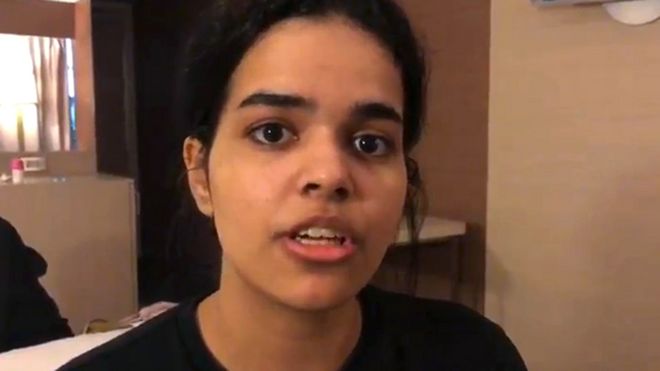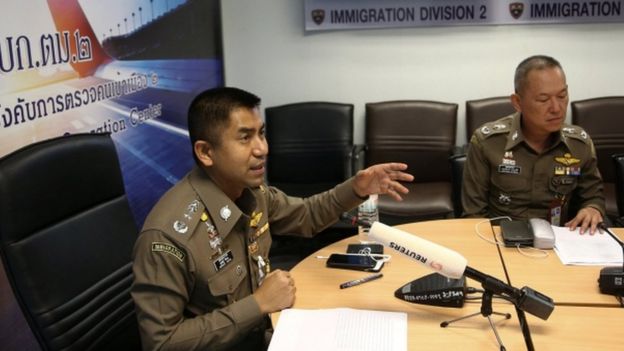- Joined
- Oct 30, 2014
- Messages
- 36,768
- Points
- 113

Thai immigration officials had tried to return Rahaf Mohammed al-Qunun, 18, to Kuwait, where her family is.
She refused to board a flight to Kuwait City on Monday, and barricaded herself into her hotel room at Bangkok airport.
The teenager said she believed her family would kill her if she went back because she had renounced Islam.
The Thai authorities said her status would be assessed by the UN refugee agency.
"My brothers and family and the Saudi embassy will be waiting for me in Kuwait," she told Reuters.
"My life is in danger. My family threatens to kill me for the most trivial things."
Rights groups including Human Rights Watch have expressed grave concerns for Ms Mohammed al-Qunun, who arrived at Bangkok's international airport on a flight from Kuwait. She had travelled to Thailand for a connecting flight to Australia, where she hoped to seek asylum.
Thailand's chief of immigration police Surachate Hakparn said on Monday afternoon local time that the country would "protect her as best we can".
"She is now under the sovereignty of Thailand, no-one and no embassy can force her to go anywhere," he said. "We will talk to her and do whatever she requests.
"Since she escaped trouble to seek our help... we will not send anyone to their death."
An injunction filed by Thai lawyers in Bangkok criminal court to stop the deportation was dismissed earlier on Monday.

Thailand is not a signatory to the UN Refugee Convention, and provides no legal protection to asylum-seekers - although there are more than 100,000 refugees in the country.
How did the stand-off start?
Ms Mohammed al-Qunun says that when she arrived in Bangkok on Saturday, her passport was seized by a Saudi diplomat who met her coming off the flight.
On Sunday, Thailand said she was being deported because she did not meet the requirements for a Thai visa.
However, Ms Mohammed al-Qunun insists she has a visa for Australia, and never wanted to stay in Thailand.
The Saudi embassy in Bangkok said Saudi Arabia did not have the authority to hold her at the airport, and said she was stopped by Thai authorities for "violating the law".
Phil Robertson, deputy Asia director for Human Rights Watch, told the BBC: "It seems that the Thai government is manufacturing a story that she tried to apply for a visa and it was denied... in fact, she had an onward ticket to go to Australia, she didn't want to enter Thailand in the first place."
He argued that the Thai authorities had clearly co-operated with Saudi Arabia, as Saudi officials were able to meet the plane when it arrived.
How was the world alerted?
Ms Mohammed al-Qunun started attracting attention with her social media posts over the weekend. She has also given a friend access to her Twitter account, calling it a contingency in case anything should happen to her.
"I shared my story and my pictures on social media and my father is so angry because I did this... I can't study and work in my country, so I want to be free and study and work as I want," she said.
Women in Saudi Arabia are subject to male guardianship laws, which mean they need a male relative's permission to work, travel, marry, open a bank account, or even leave prison.
Ms Mohammed al-Qunun wrote on Twitter that she had decided to share her name and details because she had "nothing to lose" now.
She has asked for asylum from governments around the world.
A photo appeared of her in her room as officials reportedly stood outside, waiting to put her on a flight back to Kuwait.
Why are there fears for her welfare?
Ms Mohammed al-Qunun told the BBC that she had renounced Islam, and feared her family would kill her if she was sent back to Saudi Arabia.
Freedom of religion is not legally protected in the Islamic kingdom, and people who convert to another religion from Islam risk being charged with apostasy - or abandoning their religious beliefs.
The crime is legally punishable by death - although courts have not carried out a death sentence in recent years.
Alternatively, Ms Mohammed al-Qunun could be charged with terrorism. Saudi Arabia's counter-terrorism law and a series of related decrees are used to criminalise a wide range of acts, including insulting the country's reputation, harming public order, and "calling for atheist thought in any form".
An adult woman who does not heed her guardian can also be arrested on charges of "disobedience". If a woman is detained for any reason, the police will not release her unless her guardian comes to pick her up, even if she faces no criminal charges.
Ms Mohammed al-Qunun's case echoes that of another Saudi woman who was in transit to Australia in April 2017.
Dina Ali Lasloom, 24, was en route from Kuwait via the Philippines but was taken back to Saudi Arabia from Manila airport by her family.
She used a Canadian tourist's phone to send a message, a video of which was posted to Twitter, saying her family would kill her.
Her fate on arriving back in Saudi Arabia remains unknown.
https://www.bbc.com/news/world-middle-east-46777848









